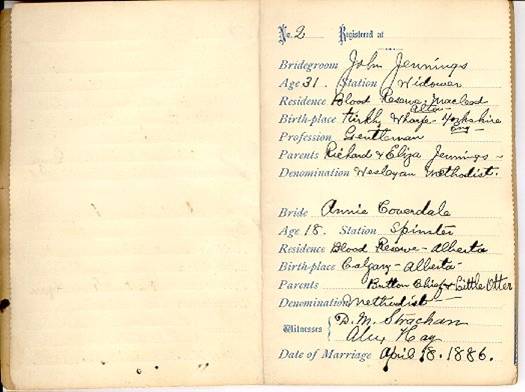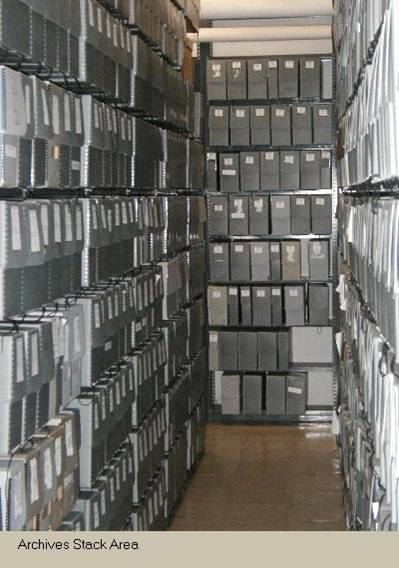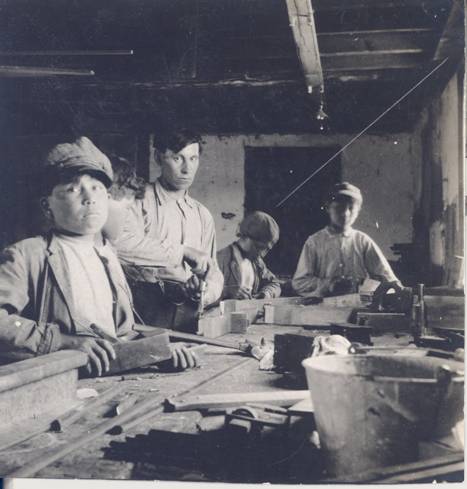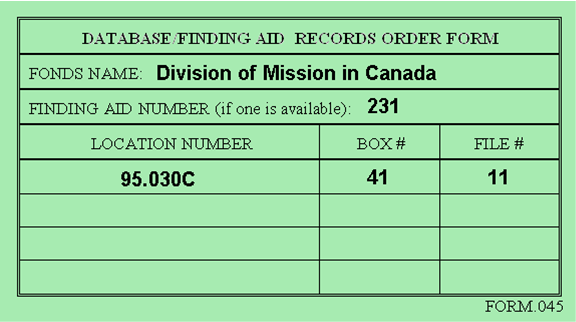|
Our thanks to Sharon Larade and Susanne Clark
of the UCC/VU Archives for contributing text and graphics to this
page!
|
The United Church Archives
Phone:
416-585-4563
Reference Desk hours:
(Mon–Thurs 10am-4:45pm) 416-585-4564
Street Address:
95 Charles St. West (Birge-Carnegie Building)
Mailing Address:
73 Queen's Park Cres. E.
Toronto, ON M5S 1K7
Useful links
The new website for the UCC/VU Archives. This is a new site, still under development. For submitting enquiries please use the current website. (The new website allows you to
- Search Archival Holdings (ARCHEION)
- Search Library Holdings (UT Cat)
- Use Religious Archival Resources
Sources
of Religious Records in Ontario from the government of Ontario.
Presbyterian Church in Canada,
Archives and Records Office.
Anglican
Church of Canada, General Synod
Canadian Baptist
Archives (at McMaster Divinity College)
General Archival Resources
University
of Toronto Library Catalog (UT Cat)
Early Canadiana
Online. (For access to documents, go to the U of T Library; enter
"Early Canadiana" in the search box and select "eresources"
in the dropdown box; and be prepared to enter your library card number
and PIN.
The Edith Reed Scholarship
The Edith Reed Scholarship is awarded to students of Victoria College
who have completed fifteen credits of an honors degree program in History,
or to students who are engaged in basic or advanced degree studies at
Emmanuel College, or to graduates of Victoria College or Emmanuel College
engaged in post-graduate studies in the University of Toronto, for research
work in the United Church Archives on material related to the United Church
of Canada and/or the founding churches.
Qualifications:
Must have done research in the United Church/Victoria University Archives
on the United Church of Canada or the founding churches
Must be a Victoria/Emmanuel College student or a Victoria/Emmanuel College
graduate
Preferably must have produced a paper or thesis, or thesis nearly completed.
}
What's the United Church archives?
 The Archives
acquires and preserves records, private documents, and publications, in
all media, pertaining to the history of The United Church of Canada and
its antecedent denominations, and to the history of Victoria University.
It makes these materials available to researchers (including students
in this course!) in accordance with accepted professional principles and
procedures.
The Archives
acquires and preserves records, private documents, and publications, in
all media, pertaining to the history of The United Church of Canada and
its antecedent denominations, and to the history of Victoria University.
It makes these materials available to researchers (including students
in this course!) in accordance with accepted professional principles and
procedures.
It's the largest religious archives in Canada. It has a staff of seven, and serves over 3500 researchers a year in person. It acquires 75 linear metres of records per year. The UCC archives has over 14000 boxes or records stored in temperature and humidity controlled storage areas.
A brief history
 1925.
The Historical Committee of the United Church receives responsibility
to preserve the records of the new church and its antecedent denomination.
1925.
The Historical Committee of the United Church receives responsibility
to preserve the records of the new church and its antecedent denomination.
1940. Victoria University agrees to house the records of the Church.
1953. The first full-time Archivist-Historian is appointed. The Central Archives of the United Church is formerly established.
1972. The Archives is moved to the Birge Carnegie Building after renovations to provide the appropriate environment for the preservation and use of records.
1985. The historical records of Victoria University are transferred to the Archives upon the establishment of a joint Archives Management Committee.
The United Church and Victoria University jointly fund the operation of the Archives.
Holdings
 National records
of the United Church of Canada and its antecedent denominations (Methodist,
Presbyterian, Congregational and Evangelical United Brethren).
National records
of the United Church of Canada and its antecedent denominations (Methodist,
Presbyterian, Congregational and Evangelical United Brethren). - Records of the five central Ontario Conferences of the United Church (Bay of Quinte, Toronto, Hamilton, London and Manitou).
- Records of some interchurch organizations, including: Canadian Society of Church History, Canadian Temperance Federation, Ontario Council of Christian Education, Ontario Prohibition Union, Project North, Toc Alpha etc.
- Collections of subject, biographical and local church history vertical files.
- The records of Victoria University and its constituent colleges, Victoria College and Emmanuel College, are housed at the Archives. (These records include those of the governing bodies, administrative offices, student organizations, alumni associations, and other campus organizations.)
 Personal papers of individuals
associated with the United Church and its antecedent denominations or
Victoria University. These holdings include correspondence, diaries,
speeches, lectures, sermons, and personal baptism/marriage/burial registers.
Personal papers of individuals
associated with the United Church and its antecedent denominations or
Victoria University. These holdings include correspondence, diaries,
speeches, lectures, sermons, and personal baptism/marriage/burial registers.
- In addition to the regular personal papers, the Archives has a Personal Papers Collection (Finding Aid 305) with additional information. The information contained within the Personal Papers Collection (FA 305) is limited, only one or two files in extent.
- Over 30,000 photographic images that are key word searchable in our GRAPHICS Database. This collection contains images of people, buildings, and events in the life of the church in Canada and abroad, and Victoria University. Photographs document the work of the Church in such areas as education, health care, immigration, labour conditions, poverty, the role of women, and other social issues
- Published materials including: publications (monographs and serials)
produced by the United Church and its antecedent denominations;
monographs, theses, and pamphlets about the Church and its leaders;
histories of local congregations (mainly in Ontario); an extensive collection of publications documenting Methodism in particular;
select publications by and about Victoria University.
The organization of the archives
Most mainstream archives are now organized in similar ways. The main principle of collection is that archives are kept together according to the order in which they are received. This is called the principle of provenance. For archives of institutions, this means that the records will reflect the organizational structure which produced them.
-
 Fonds.
The whole of the records, regardless of form or medium, automatically
and organically accumulated by a particular individual, family, or
corporate body in the course of that creator's activities or functions.
Note: The fonds is the highest level of description in a multilevel
description in a particular repository. A fonds is not equivalent
to an accession and may contain two or more accession units.
Fonds.
The whole of the records, regardless of form or medium, automatically
and organically accumulated by a particular individual, family, or
corporate body in the course of that creator's activities or functions.
Note: The fonds is the highest level of description in a multilevel
description in a particular repository. A fonds is not equivalent
to an accession and may contain two or more accession units. -
Series. A group of similar records that are arranged according to a filing system and that are related as the result of being created, received, or used in the same activity; a file group; a record series.
-
Subseries. A body of documents within a series readily distinguished from the whole by filing arrangement, type, form, or content.
-
Accession. A body of material from the same source taken into archival custody at the same time. Each new arrival of records to the Archives are assigned a specific number – or accession number - to identify the group of records and point to their physical location in the stacks.
-
File. A group of documents related by use or topic, typically housed in a file folder
Using the archives
This collection does not circulate and is only available to researchers who visit the Archives.
When you search for an item at the UCC/VU Archives, you can choose one of the available categories:
- Archives. The main database of the Archives' catalogued holdings described at the fonds, series and subseries level as per Rules for Archival Description. This material is gradually being made available on ARCHEION for online searching.
 Graphics.
Item list of photographs in the Archives, described according to AACRII
Graphic Materials. [Shown: Carpentry class, Brandon
Industrial Institute, 93.049P/1368 N.]
Graphics.
Item list of photographs in the Archives, described according to AACRII
Graphic Materials. [Shown: Carpentry class, Brandon
Industrial Institute, 93.049P/1368 N.] - Bio. Biographical database of names of United Church (and antecedent denominations) ministry personnel, missionary personnel and other prominent personnel, Victoria University faculty, staff and alumni. Also serves as an index to the Biographical Files Collection.
- Acc. Accessions database – database of the Archives' Uncatalogued holdings.
- ROPreports. Index to the Reports of Record of Proceedings (1925-1962), compiled by Grant Bracewell. Complete to 1962 as of May 2004.
- Names. Index of Names in the United Church of Canada Year Book, Record of Proceedings of General Council, and Walkington Directories (1925-1962), compiled by Grant Bracewell. Complete to 1962 as of May 2004.
- GCE. Index to the minutes of the General Council Executive of the United Church. Complete to the end of 1985 as of May 2004.
- AnnReps. Annual Reports database which lists holdings of congregational annual reports and newsletters at the item level. This database may be especially useful for local church history research.
 From the description
in the Finding Aid you can find the particular accession you need. Fill
out a request form and give it to the reference archivist on duty.
From the description
in the Finding Aid you can find the particular accession you need. Fill
out a request form and give it to the reference archivist on duty.
The library holdings can be searched on the University of Toronto Library Card Catalogue.
The results will give you the following information.
- Title Area. indicates level of description (fonds, series & subseries), title of group of records, date range of records contained within the description and physical extent of records (80 cm = ca. 6.5 archival boxes)
- Administrative History. A brief history concerning the life and activities of a corporate body responsible for the creation, receipt, or accumulation of archival material being described. Basic information usually includes the names by which a body was known, dates of existence, geographic loca-tions, and major sphere of activities. OR:
- Biographical Sketch. A brief history concerning the life and activities of an individual or family responsible for the creation, receipt, or accumulation of archival material being described. Basic information usually includes full names, if possible, vital or active dates, geographic locations, occupations or activities.
- Finding Aid. A reference to where a finding aid may be found in the Archives reading room. Finding aids are descriptive tools containing information about records in archival custody, that establish administrative, physical, or intellectual control over the holdings of an archives, and make it possible to retrieve particular records or information from these archives.
- Location Number (also known as Accession Number). A specific number used to identify a group of records and point to their physical location in the stacks. (E.g. 95.030C)
- Scope & Content Note. A summary of the nature and contents of the material being described, derived from an analysis of it. Scope and content may include information on record types, significant subjects, arrangement, the activities which generated the records, etc.
- Notes. Additional information that may be helpful to researchers.
- Restrictions. Any conditions which affect when and how records may be viewed for research purposes within an archives. Researchers may be required to fill out a form to access partially processed records, or obtain permission from Church House lawyers to access unprocessed / catalogued records.
- Related Materials. Materials of a similar subject matter that may be of interest to researchers. Often refers to antecedent or superceding bodies.
- Principal Access Point (s). A formal / official name, term, etc., under which a descriptive record may be searched and is identified.
- Subject (s). Library of Congress subject headings listing the subjects (or topics) contained within a group of records.
Finding Aids need to be consulted by researchers in order to obtain accession and box-file numbers for retrieval.
Formalities
- All researchers will be asked to complete a registration form each calendar year and present it to the reference Archivist on duty.
- Researchers are also required to sign in daily.
- All coats, bags and purses are to be placed in lockers provided.
- No food or beverages (including water) are permitted in the Reading Room.
- Laptops are permitted in the Reading Room and power bars are provided.
- Wheelchair access is available from the southeast entrance of the Archives.
- A Reference Archivist is available for assistance during all of our public hours.
- The Reference Archivist will direct researchers to relevant databases, finding aid and other research tools and educate them on their use.
- Once researchers have located the information they are seeking, the Reference Archivist will retrieve the desired items and sign them out for consultation in our Reading Room.
- Researchers are limited to consulting only two archival boxes at a time, and microfilm copies of material will be used whenever available.
- All restrictions are indicated in the Archives Database.
- Processed/Catalogued National United Church records are open to researchers subject to the completion of FORM 26 and any other restrictions that currently exist.
- Unprocessed/Uncatalogued National United Church records will not be made available to researchers without permission granting access from the United Church Lawyer or the Lawyer's Executive Assistant.
- It is the responsibility of the researcher to gain permission for access to unprocessed National United Church Records from the United Church Lawyer.
Photocopying
- Permission is required by the Reference Archivist before photocopying.
- The Reference Archivist has the right to refuse photocopying for the following reasons: (a) In the opinion of the reference staff person, the originals are too fragile to be copied without damage; (b) the records are restricted or have any restrictions on reproduction; (c) reproduction involves an infringement of copyright or other legal restrictions.
- Researchers are allowed to do their own copying unless otherwise indicated by the Reference Archivist.
- Photocopies are 50¢.
- Users will complete the Photocopy Payment Form (Form.013),
provided at the Reference Counter and keep track of copies
made during the day. Payment can be made at the Registration
Counter before 4:30 each day.
All photocopies are marked with an identification area to encourage researchers in recording the information required if they need to request the document again; or cite the document in a footnote. This area includes a copyright notice, as well as an area to identify the Accession, Box, File and/or Reel Number in which the document was found.
Copyright matters are subject to the provisions of Canada's Copyright Act. Copies are provided solely for the purpose of research or private study; use for any other purpose may require the authorization of the copyright owner. The researcher assumes full responsibility for locating the copyright owner and obtaining any necessary authorizations for publication or any use other than research or private study. The Copyright Act requires that the Archives make available to the author or copyright holder, upon request, information about copies made during research.